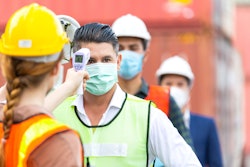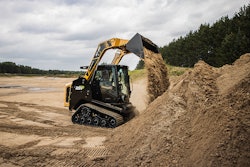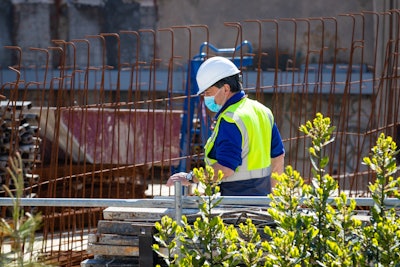
Now that 2020 is basically a known quantity, Equipment World editors reached back to several of the contractors we talked with this spring with one basic question: what happened?
We learned that 2020 was far from a universal experience. Read on.
Rick Goodmanson
Goodmanson Construction
Roseville, Minnesota

“It was a wild ride, that’s for sure,” Rick Goodmanson says. “This year has been the most difficult of my career – No. 1, No. 2 and No. 3, probably all together.”
In March, the commercial concrete and asphalt contractor was poised for another year of exponential growth. Then Covid-19 led clients to pull back on projects as they focused more on safety compliance to prevent the virus’ spread.
“A lot of what we were hearing from our customers was there just wasn’t time to deal with expansion projects and maintenance projects,” he says. “Our second quarter took a real big hit,” dropping 50 percent from Q2 2019.
The company struggled to keep its employees at 40 hours a week, at a time when it typically offers unlimited overtime. A Paycheck Protection Program loan helped, Goodmanson says. The company assigned some workers to supplemental, non-revenue-producing projects to keep them busy.
“We believed that the back end of it was going to come at some point, and we wanted to make sure that our staff was still in a good place,” he says.
For some employees, missing out on overtime meant about a 30% pay cut. “But we knew that just keeping them at 40 hours was a lot more than a lot of our competitors were doing,” he says. “There certainly were a lot of layoffs this year in our industry – in our market, at least. And we heard a lot of that, and it was important to us that we weren’t laying people off.”
The company, which performs a lot of work for the oil and gas and logistics industries, didn’t get back to even until July. In August, work took off.
Then Covid had other plans, as some employees got sick in late September and early October. The company decided to shut down its offices, warehouses and shop. It performed extra sanitizing. Human resources personnel performed contact tracing on the workers who got sick or were exposed. Some had to go into two-week quarantine.
For a couple of weeks the company was only able to operate at 50%. “I don’t think we were at full strength for about a month because it took a while through all of the contact tracing and kind of forced quarantine,” Goodmanson says.
No one was seriously ill. Those who got sick reported experiencing symptoms similar to a bad cold or flu.
“I’d say that that period was probably just as tough if not tougher than the initial strike there back in early April,” he says.
And yet the firm’s third- and fourth-quarter results have been enough to boost revenues 10 percent over 2019. In the past few months, it has been able to purchase equipment it had postponed.
“It was probably six months of really stagnant operational activity for us just making do with what we had until we could really be more comfortable with what the future would entail,” Goodmanson says.
And heading into 2021, Goodmanson has more projects under contract than it has ever had this time of year.
“Absent of some new crisis, we’re expecting that 2021 continues just like the third and fourth quarters of 2020,” he says. “We’ve been on a big, strong uptick for the last couple of quarters, and hopefully that just continues the way that it’s been.”
–Don McLoud
Jack Bailey
JRB Incorporated
Fredericksburg, Virginia
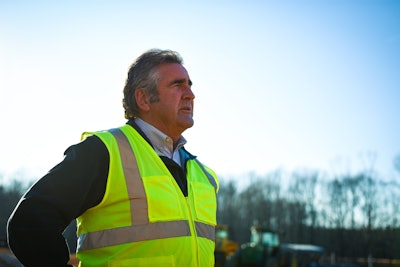
“It’s been a good year for us in spite of everything,” says Jack Bailey, president, JRB Incorporated, Fredericksburg, Virginia. “While our sales are up 18% year over year, our margins are down 2%.” Bailey says his firm is about $2 million under projections, prompted more by wet weather in May and August than economic conditions. “This year our goal was $16 million, and I think we’ll do $14 million,” he says.
Bailey credits JRB’s asset manager, a former nurse, with helping its 50 employees stay ahead of the Covid curve.
Bailey asked his office staff to track Covid-19 related expenses and says to date he’s spent close to $50,000 this year on meeting protocols and $200-per-test expenses.
But he’s more worried about the production impacts than the out-of-pocket expenses. “We had an entire crew out for two weeks,” says Bailey, who runs JBR with son Jack Bailey Jr.
While he wanted to wean his company off residential work, homebuilding is too hot right now to turn away from. “We’ll probably deliver around 250 lots to Ryan Homes this year,” Bailey says. Another 110-lot townhouse development the company completed in September is sold out. “Will it be a boom or a bust?” he asks. “We’ll see. You’ve got to be careful with housing.”
Despite a year of challenges, Bailey says his firm is going into 2021 with “a tremendous backlog,” prompted by the housing boom and general excitement around a new local Amazon distribution center. “Warehouses and distribution centers are coming in, and they’re finally widening I-95 through this area,” Bailey says.
JRB added about $1.5 million to its fleet in 2020, including dozers, excavators, loaders and trucks. The Section 179 tax deduction has played a role in the purchases, but so has the need to keep his fleet updated. He’s also considering replacing an off-road truck but says his ultimate decision will be tax driven.
“We want to be selective and to be able to turn on a dime,” he says.
–Marcia Doyle
Ken and Melissa Lester
Lester Contracting
Port Lavaca, Texas
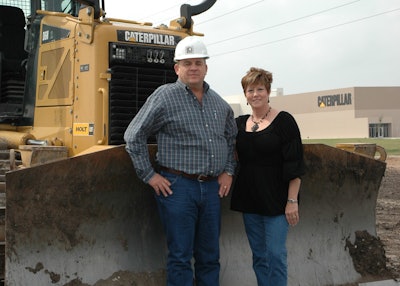
“We are bidding more aggressively,” says Ken Lester, citing less local work as one of the reasons.
And with the oil and gas market down, contractors in that segment are now bidding on work that is the company’s bread-and-butter: public work, private development, schools and industrial plants.
Even with these down forces, the Lesters have managed to keep their 100 employees busy. And the $25 million firm will start off next year with a decent backlog, say Ken and Melissa, with Hurricane Harvey-related federal funding still flowing into their south Texas region.
“There is a lot of school work in the smaller communities around the area,” Melissa Lester says. In addition, several towns have street rehab projects and a local port will be expanding.
A large Formosa Plastics plant is winding down a five-year expansion project, which represented significant work for Lester Contracting. “It accounted for nearly half of our revenue for a couple of years,” Ken says. “But you can’t stop doing what you do.”
“Because of the uncertainty, we put the brakes on equipment buying this year,” he says. Another factor: “We had ramped up for the Formosa Plastics job,” Melissa says, “so we really didn’t need any more.”
“I’m feeling optimistic,” Ken adds. “We’ll do OK; we’re just going to keep on doing what we do. We’ve always managed to scratch out some revenue and keep our business going.”
–Marcia Doyle
Brad Clubb
Flyway Excavating
Mount Joy, Pennsylvania
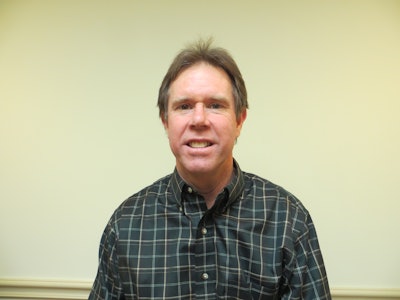
The state of Pennsylvania’s six-week shutdown ended May 9th, but Flyway Excavating found some work that was deemed essential by the state and got the firm rolling a bit sooner, says Brad Clubb.
“By May we pretty much had all of our 35 employees back, and they were all anxious to get back,” Clubb says. “We fortunately got a sizeable job the day the restrictions were imposed, which provided a little cushion” when the company was able to get going full force.
Still, it was difficult securing work until things started to loosen up in August. “We now have a better backlog going into next year than we had going into this year,” Clubb says. “It’s not a record backlog, though; it’s more middle range.”
Flyway specializes in environmental work such as stream restoration, parks and trails, mostly public work. While there were no canceled projects, one client has been late paying a $500,000 bill.
Clubb was personally reluctant to file for a PPP loan, but his son and other company owners eventually convinced him to apply. “That’s now offsetting the late money owed to us,” he says.
“We’re having a decent year,” he adds. “We’re going to make 5% profit on $11 million in sales, but we might have made 8% profit otherwise.”
He’s viewing with some wariness the fiscal health of the public entities and the work put out for bid. On the upside: the incoming Biden administration will likely favor the environmental work the company specializes in.
Whatever happens, Flyway is likely to stay the course with equipment purchases. “We have a routine program for equipment replacement and haven’t really altered our equipment plans,” Clubb says. “We usually buy $400,000 to $600,000 worth of new equipment and trucks per year and typically dispose of them through a dealer.”
–Marcia Doyle
Joyce and Bob Oliver
Total Asphalt Paving
Ray Township, Michigan

When we talked with her in the spring, Joyce Oliver was in the middle of Michigan’s spring shutdown. With no idea when the work ban would be lifted and not being able to work in the company’s prime job scheduling season, Oliver wondered whether 2020 revenues might be down by as much as 30%. Would clients cancel or reduce projects? What impact would the election have?
When we talked to her this month, however, Total Asphalt had instead grown from $5 million last year to $5.7 million this year. All this with no significant changes in the client mix. “We saw smaller work at the beginning of the season and then the larger projects started in the second half,” she says.
Why the uptick?
“We’re thinking that people were home more and doing more home projects instead of taking vacations or going out to eat,” says Oliver, whose business specializes in residential and commercial asphalt paving.
And this fall’s milder weather allowed the company to extend its paving season by a couple of weeks. “We feel very lucky, blessed and pleased with how it went,” she says.
Throughout the season, employees were fully aware that a Covid outbreak could shut down the company, Oliver says. Total Asphalt’s crews avoided the pandemic until the last two days of work when a project foreman became ill.
“We didn’t run into any issues because he was already off work, and now he’s fully recovered and we’ve all tested negative,” she says.
“There hasn’t been a big change with our customers after the election,” she adds. “I think everyone is still in a holding pattern. But the businesses we deal with have been in business for a long time, and they know you have to keep things going, that you cannot not do things.”
–Marcia Doyle
Brad Phillips
Phillips Companies
Beavercreek, Ohio

“Our retail landscaping was up 23% over last year,” says President Brad Phillips. (Phillips Companies has an October-September fiscal year.) Other divisions fared well also: aggregate production was up 7% and ready-mix increased by 3%. “And that was coming off our biggest year ever,” he says. The primary reasons for these increases: a booming homebuilding market.
The company’s excavating division, however, plummeted, with sales down more than 30% from the previous year. Clients in this area included hard-hit retail and hotels.
“We had projects that were either suspended or canceled,” Phillips says. “Commercial work is our bread-and-butter, and the bulk of that work is $300,000 to $700,000 dirt-and-pipe jobs.”
Still, the company bought a Cat 326 excavator this year along with a compact excavator and skid steer and is looking at an additional truck. Between yellow iron and trucks, the company typically spends about $2 million per year in equipment replacement.
“Right now, we have every reason to believe that 2021 won’t be bad,” Phillips says. “There’s still strong interest in homebuilding, and we’re still doing some larger commercial jobs.” Phillips expects the excavating division to be back close to pre-pandemic sales levels in 2021.
–Marcia Doyle
Jim Davis
Whirl Construction
Port Monmouth, New Jersey
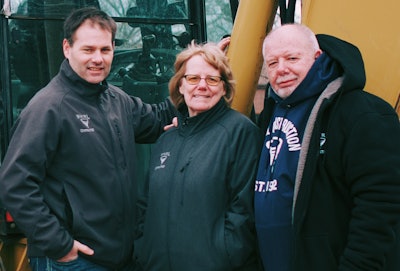 Jim Davis with parents Terry and Jim Davis Sr.
Jim Davis with parents Terry and Jim Davis Sr.Not far from Jim Davis’ office in Port Monmouth, New Jersey, you can stand at the edge of Sandy Hook Bay and see the Manhattan skyline. When the claws of Covid-19 sank into New York City earlier this year, Davis and his company, Whirl Construction, where he serves as vice president, were peering into the pandemic’s epicenter.
But they adjusted quickly. The weekly Tuesday safety meeting became even more important as infection numbers rose and conditions changed daily. Thanks to a prior investment in cloud-based platforms, remote work was implemented quickly and administrative work wasn’t disrupted when much of the company’s office began working from home and others rotated on a schedule between the home and office.
Whirl specializes in the installation of playground and recreation equipment, shelters, restrooms and concession buildings. Nine months into the pandemic, it hasn’t had to shut its doors once. The office is still mostly remote, and the crews in the field have been able to keep consistent work.
To reduce potential spread among employees, Davis says the company treated its crews kind of like pods, keeping the same crews together job-to-job. Since the pandemic began, the company has only had two employees test positive.
“We did some take-your-car-to-the-job type of thing at the beginning, instead of everybody jumping in the same truck,” Davis says. “We just kept watching the numbers and we tried to stay in areas that were less pronounced than others, and that really helped us navigate through.”
Whirl will probably end the year down about 30% in the total number of jobs completed, according to Davis. While the dip definitely hurts, Davis says that in some ways the pandemic has pushed the company forward, forcing it to diversify sooner than planned. While the company has thrived for nearly 40 years on mainly playground projects, it’s now moving into more streetscape and excavation work.
“We purchased a couple pieces of equipment this year that we finally pulled the trigger on, and we’ve been more versatile than ever. We’re bidding things that we never would even pick up 10 years ago,” Davis says. “…So, you know, are the job numbers lower? Yeah. But have we had to lay anybody off? No. And most importantly, we kept the team and all the pieces of the puzzle together, which is key. Because the last thing we want to do is lay people off.”
With this increased versatility, Davis has a bright outlook for 2021.
“We’re kicking on all cylinders,” he says. “It just makes me firmly believe that we’re set up for a good year next year.”
–Wayne Grayson
Clint and Amber Stephenson
CLS Excavation
Liberty Hill, Texas

The first jobs at Liberty Hill, Texas-based CLS Excavation were halted in March. By April, the cocktail of local government restrictions, slowed permitting, wary project owners and economic tumult resulted in a total shutdown for the company owned by Clint and Amber Stephenson.
“My yard looks like an auction site right now,” Stephenson joked in April.
CLS’s commercial work in Liberty Hill and the Austin metro area has been hit hard and roughly $3 million worth of work has been pushed to next year.
A PPP loan provided about six weeks’ worth of payroll – enough breathing room to allow Stephenson to avoid layoffs entirely even though work completely dried up for a while.
Stephenson says his way of financing equipment also helped. “I don’t have everything just set up on like a monthly payment; I’ll do year notes,” Stephenson explains. “Monthly, I pay interest, and then as I get chunks of money, I just pay my equipment down. I tend to pay stuff off a whole lot quicker when I do it that way. And then at the same time, if I need some breathing room, it’s not strangling me.”
All told, Stephenson says revenue will likely be down 50% in 2020.
“So, this year hadn’t been a steak; it’s been a rice and beans kind of year. But we’ve been able to weather it,” he says.
Though work completely shut down for a time, with the breathing room afforded him, Stephenson leaned on his relationships, making calls to look for any work he could get. Some past clients called on CLS to finish a job, which is not typical work for the company, but represented a couple months of work.
Despite the pain of this year, Stephenson has his eye on 2021. While some of the jobs on the slate for 2020 have been put on an indefinite hold or have seemingly vanished, a lot of work was simply rescheduled to next year.
“I’ve got an RV park that’s going to kick off; I picked up a subdivision job, and I’ve got a school project that is set to start in March,” Stephenson says. “So really, if everything goes according to plan, this will be my fastest start to a year that I’ve had in a long, long time. So that’s looking pretty good for me.”
–Wayne Grayson
Ray Lippis
Ray Lippis Excavating
Canon City, Colorado
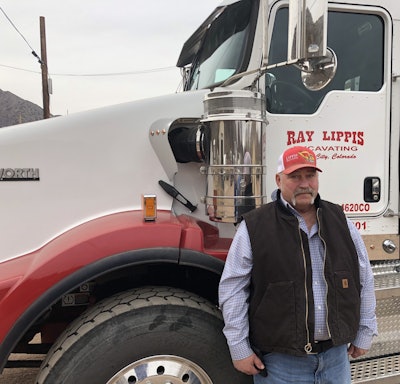
“Things are pretty good here,” says Ray Lippis.
Lippis has been able to stick to the company’s equipment replacement plans. He bought a new skid steer earlier in the year and recently purchased a new Cat 938M wheel loader.
The biggest challenge has been finding enough workers. He has added one new employee and continues to look.
“We just can’t seem to find anyone,” he says. “We’re still looking, working, praying – everything imaginable.”
Growth for the company has been in residential and in emergency water and sewer work. It also landed two new contracts at the U.S. Army’s Pueblo Chemical Depot for 2021.
“We’re booked out two months right now. Realistically, it’s probably three or four,” he says. “But so far, we’re blessed. Going into hard winter, we don’t ever see this kind of backlog.”
–Don McLoud


